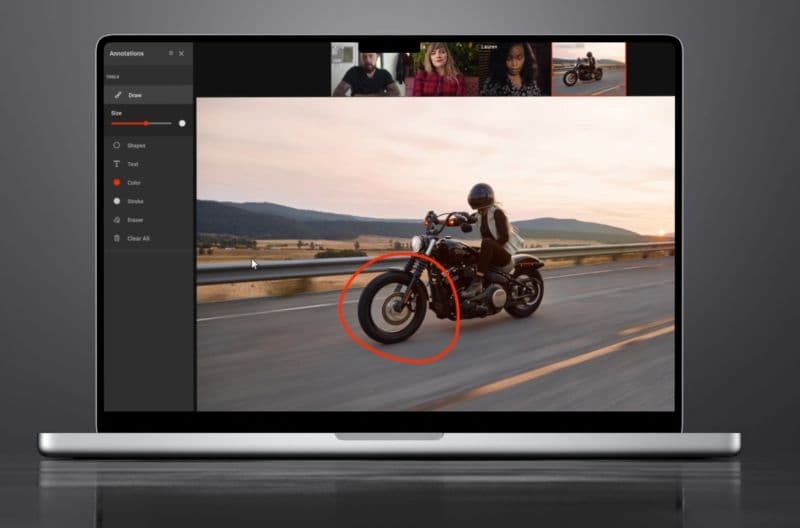Evercast reinvents film production with new WebRTC standard

A secure, remote-collaboration tool for major motion picture editing
About
Evercast emerged as a first-of-its-kind virtual, video-editing platform tailored to meet the performance and security needs of major motion picture studios.
Accelerated by the pandemic, Evercast brought real-time, remote video editing to movie studios for the first time — reinventing how movies are made.
Evercast combines high-quality video conferencing with the ability to securely stream media content from any source in 4K resolution and ultra-low latency, enabling creative professionals to work together in real time as seamlessly as if they were in the same room.

4K
encrypted streaming over browser at 60fps
250+
real-time virtual editing “rooms”
1
Technical engineering Emmy
Challenge
Even before the pandemic underscored the need for remote collaboration, the lack of a secure and robust platform for industry professionals, like editors and producers, to work remotely on intellectual property while enabling real-time collaboration was hindering film and television production workflows.
 The need for a forward-thinking solution was clear, though its urgency was not yet realized by the industry at large.
The need for a forward-thinking solution was clear, though its urgency was not yet realized by the industry at large.Related: Read about this e-learning platform that’s reshaping education
Solution
To meet the stringent security demands of the media and entertainment industry, Lumenalta prioritized building a trusted foundation for Evercast. The team started with security front and center.
- The database was sectioned off using row-level security (RLS) and role-based access control. Stateless sessions implemented with JSON web tokens, cross-origin resource sharing, and cross-site request forgery protections mitigated the risk of session hijacking attacks.
- Universally unique identifiers were deployed across all media types to mitigate direct object reference attacks.
- Multi-layered authentication and monitoring were employed for access to video rooms, including via standard two-factor authentication and permission systems for invited guests.
- IP addresses were stringently managed between Session Traversal Utilities for NAT (Network Address Translators), Tenant Union Representative Network (TURN), Selective Forwarding Unit (SFU), and API servers to create a trusted network for studios with extreme firewall configurations.
This security framework enabled Evercast to stand up against regular studio security audits and professional whitebox hands-on pentests every 6 months.
Leveraging cutting-edge WebRTC codecs like vp8, vp9, and eventually AV1, along with Secure Real-Time Transport Protocol (SRTP), and built around a custom signaling protocol, Evercast was able to fit more quality, more security, and more convenience into browser-based video streaming technologies.
 Once the core security requirements were addressed, Lumenalta focused on optimizing Evercast’s performance and streaming capabilities. The team optimized the SFU at the operating system level, tweaking everything from network adapters to multithreading logic in C code, implementing Simulcast and eventually scalable video coding.
Once the core security requirements were addressed, Lumenalta focused on optimizing Evercast’s performance and streaming capabilities. The team optimized the SFU at the operating system level, tweaking everything from network adapters to multithreading logic in C code, implementing Simulcast and eventually scalable video coding. Amazon Elastic Kubernetes Service (EKS), networking techniques like broadcast addresses, and advanced WebRTC design patterns enabled relay servers for large scale video rooms.
The Evercast Broadcasting Software (EBS) desktop application, based on Open Broadcaster Software (OBS), provided media professionals precise control over streaming settings tailored to their production needs by leveraging the best-available encoder routines used by professional streamers globally.
These encoders, available behind a General Public License Version 2.0 license, allow CPU-efficient capture of editor workflows including Blackmagic boxes, After Effects, and more.
 Editors would connect their machines outputs through this hardware and Evercast would then receive the video and audio feeds from laptop inputs.
Editors would connect their machines outputs through this hardware and Evercast would then receive the video and audio feeds from laptop inputs. This allowed the production machines to remain air-gapped and to protect their processing power while streaming happened on a separate computer. This innovative approach was key to early success.
Results
Tackling security first with a robust backend ensuring data accessibility only to authorized users, Lumenalta created Evercast — a revolutionary high-performance remote collaboration solution tailored for editorial and post-production teams in the film and television industry.
 This groundbreaking platform seamlessly integrated video conferencing, streaming, annotation, recording, and key features like frame-accurate playback into a single interface, facilitating real-time creative collaborations for up to 256 concurrent teams.
This groundbreaking platform seamlessly integrated video conferencing, streaming, annotation, recording, and key features like frame-accurate playback into a single interface, facilitating real-time creative collaborations for up to 256 concurrent teams.By combining VP9, Opus, and SRTP via WebRTC, Evercast was able to successfully deliver unparalleled performance to creative professionals whether they were in the studio or in their apartments. By partnering with the open source community, including Janus Gateway, Cosmo Software, and the OBS project, Evercast was at the forefront of all industry developments.
The WebRTC engine built into OBS was inspired by Evercast, and many advancements in Janus Gateway (like NodeJS and Lua plugins) were a direct result of Evercast’s contributions. Evercast even attended an Internet Engineering Task Force conference in Montreal where leading experts from Mozilla, Chrome, and members of the Alliance for Open Media to advocate for browser-level adoption of unreleased technologies.
Recognized with a technical Emmy and WebRTC patent for setting new standards, Evercast’s innovative platform adapted to evolving industry needs, influencing major studios’ production processes before, during and post-pandemic.
The software is now used by major Hollywood studios on top-tier productions like Godzilla, King of the Monsters.
By progressively enhancing video quality, latency, and collaboration features, Evercast continues transforming how global creative teams seamlessly produce content, remaining pivotal in advancing remote collaboration tools within media production.
Evercast reinvents film production with a new standard in WebRTC.



